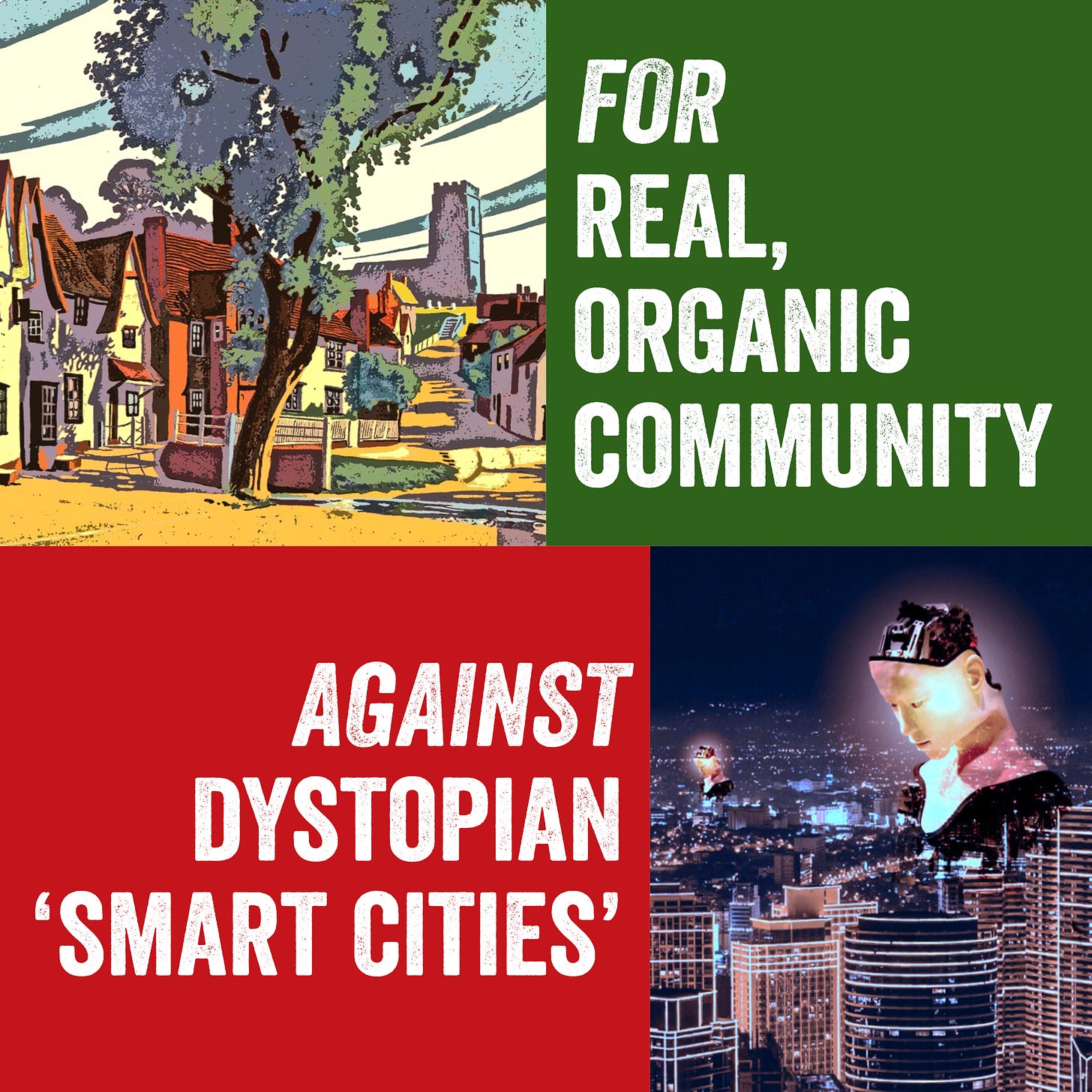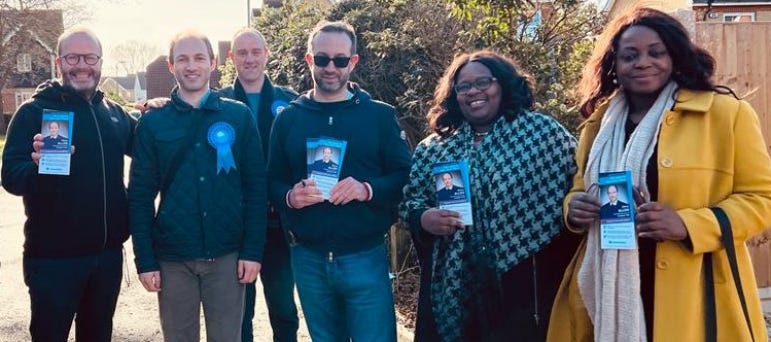Ever since the outbreaks of disorder after the tragic murder of three young girls at a Taylor Swift themed dance event in Southport, there has been a lot of debate about the motives of those taking to the streets. I put up some posts about how the situation was developing and then, took a break from blogging. Here are the posts: This is what a lack of trust looks like... 31.7.24 and: Problem, reaction, solution - how it's playing out so far 6.8.24 and then: So, what the heck was that all about? 8.8.24.
I needed a break to start doing some meaningful thinking about where we are as a society and why things seem so brittle. That thinking involves going to places that I used to be wary of and having to contemplate repudiating positions that I held a decade or so ago. That's not a comfortable place to be but, given that I'm now effectively politically homeless, it's a lot easier than it would have been a while back.
I've written about the dizzying pace of change that's a feature of modern life, and how that's leaving more and more people feeling disorientated, demoralised and increasingly, as we've seen on the streets here in the UK, angry: Change... 3.7.23.
While people want change they can consciously direct, they also want some degree of continuity and stability in their lives as well. So when their perceptions of family values are challenged and the beliefs they've held dear for much of their lives are denigrated, please don't expect it to end well because it won't! Shaming people for their values and cajoling or forcing them to change to embrace a world view they find unacceptable will inevitably generate a reaction – one that many people who see themselves as 'progressives' will not like!
If change leads to an improvement in people's lives, by and large, they'll welcome it. If it's change that people have been instrumental in bringing about, it will feel empowering. The problem is that change wrought by the mass of people to improve their lives is a very, very rare thing. In the dysfunctional and increasingly dystopian society we have to endure, change feels like it's something that's being done to us by elites that are actively hostile to the majority of us. That can only go on for so long before something gives. It feels like that point has arrived.
While people will welcome positive change that they themselves have wrought, they want that to be in the context of living in a society with a degree of stability, predictability and trust. It feels like we're losing that as we lurch towards a dystopian future, led by elites who despise our desire for stability. What most people want is work that's meaningful, secure and pays enough to support a decent life. What they also want is access to decent housing in a pleasant environment. On top of this, they want to live in a community where there's a degree of cohesion and mutual trust, and above all, where they feel safe. All of these are becoming increasingly hard to attain as we slide towards dystopia.
What has compounded things is the feeling that change is coming at an ever increasing pace and none of that change is good because it's imposed from the top down. Granted, social media does have an amplifying effect but, you only have to use the evidence of your own experiences to conclude that the pace and intensity of change is now unsustainable when it comes to our mental health and general well being.
There's the changes wrought by de-industrialisation in the UK, with the heaviest impacts being in South Wales, the Thames estuary, the Midlands, the North, the Central Belt of Scotland and Belfast in the North of Ireland. There are people far better qualified to talk about this than me, so, I present you with this: The working classes need solidarity, not a second referendum - Dr Lisa McKenzie | UK in a changing Europe | 12.11.18.
Deindustrialisation has had the same devastating effects upon working class peoples’ lives as the industrial revolution did.
I am from a mining community on the Nottinghamshire/Derbyshire border, and my family live very close to Cromford, the site of Arkwright’s Cotton mill and the birthplace of the industrial revolution.
Within a 20 mile radius of where I grew up there were once hundreds of thousands of jobs that employed working class people holding together communities, families and working class identities.
This is the place where trade unionism was formed and workers’ rights fought for, where men women and children once dug out coal naked three miles underground, after walking five miles to get to their places of work.
The British working class have unionised, fought, died and survived in places that were hostile, but their resilience turned those places into warm and creative communities.
After those mines closed, and the factories that took the places of the mills moved overseas, it is now monstrous distribution warehouses that stand in their place. Sports Direct, Amazon, Boohoo and many others are the new mills of exploitation – poorly paid, with only a soul-destroying prospect of a future.
There's also the changes wrought by technology and the increasing digitisation of our lives that's leaving a number of older people marginalised and excluded. This is something I wrote about at some length in this piece: The de-humanising shittiness of modern life 6.8.23.
What's also de-humanising and pretty shitty is the way those who can't or refuse to accept getting sucked into the digital control matrix as cast off to one side. That's particularly the case with elderly people who can't get to grips with digital interfaces which all too often, feel like they're put together by someone with scant regard for the quality of user experience. It's a case of take it or leave it and if you can't cope, that's tough shit. Is that the future you want where those who can't keep up with the relentless and often, pointless pace of change are slung onto the scrap heap? One where those elderly people who can't deal with the pointless complexity and shittiness of modern life are dismissed as little more than 'useless eaters'?
Then there are the demographic changes brought about by immigration. If there had been a concerted and consistent effort at assimilation and integration that would have enabled all immigrants to fully participate in society, then the only debate about immigration would have been about numbers in the context of the resources and services needed to sustain a growing population. It does need to be noted that some demographics of immigrants have been far better at integrating themselves than others. However, with decades of multiculturalism, we have groups of people who may well be living close to each other but, because they're effectively living in silos, they have relatively little contact with each other. That's a recipe for breeding mutual mistrust, leading to tensions which always have the potential to end up in street disorder.
I've been writing about the problems arising from multiculturalism for over two decades. Along with many other commentators criticising this doctrine, I'm in the unhappy position of having to say 'we told you so'. It gives me absolutely no pleasure to have the predictions about the consequences of multiculturalism and the lack of assimilation proven to be right: A warning from the past... 5.8.24.
Multiculturalism has failed - where do we go from here?
Originally anti-racism placed a strong emphasis on fairness and equality, with the aim of uniting people rather than dividing them. Multiculturalism, which insists everyone be treated differently, undermines the concept of fairness.
Examples abound: calls for the state funding of religious schools, money going into projects that benefit one particular ethnic or religious group at the expense of the whole community, and increasingly segregated schools and housing.
It is now clear that promotion of multiculturalism was never intended as a stepping-stone to universal social justice for all. It is instead a replacement for it. It stems from the desire to ensure the working class remains divided and demoralised while a devastating neo-liberal agenda is driven through.
For us, the choice for the future is stark. Either we draw together in pursuit of our common interests, or we sit back and allow multiculturalism to produce its bitter fruit - the disintegration of our communities and the growth of political and religious extremism.
I've written a few times about the breakdown in cohesion and trust in a growing number of our towns and cities. A breakdown brought about in part by the aforementioned demographic changes. A breakdown that leaves people feeling disempowered and looking increasingly to the 'authorities' to try and restore some semblance of cohesion, even when those authorities, ultimately acting to implement the will of the World Economic Forum, have no intention of doing any such thing. When the objective is the demoralisation of the populace at large prior to an accelerated imposition of the 'great reset', the last thing the powers that be want is stable and confident communities. This is something that I started to address in my previous piece: Cohesion vs division 3.9.24.
There are no easy answers as to how we can rebuild a sense of trust between groups of people who have been stoked up to distrust and despise each other. There are also no easy answers to persuading people who know they may only be living in an area for a short period before moving on, that they have a stake in and a responsibility towards where they live. It means having to have some pretty frank and open conversations about the issues that are splitting neighbourhoods. It also means having to agree on what is and isn't acceptable conduct in a bid to make our neighbourhoods safer places to live in. Again, there are no easy answers to the myriad problems that having these conversations and setting these standards will throw up.
Underlying a lot of what I've written in this piece is people's desire not just for stability, but also for a sense of belonging. One of the reasons the two of us behind this project upped sticks from Essex just over two years ago to move down to Keynsham was to be closer to our family. We can't do our job as grandparents over a hundred and fifty miles away on the other side of the country. We can do it living just over a mile down the road though:) Family may be a dirty word for a fair number of radicals but, as I've grown older, I've learnt to appreciate the sense of connection and belonging it brings. Obviously, not everyone has had the fortune to have come from a stable and loving family background. I recognise that families can be dysfunctional as I know only too well from the experiences I had when I was growing up. However, when it works, family can offer a sense of belonging and stability that's a bulwark to an ever more dysfunctional modern world.
When we moved down from Essex, it was a wrench leaving friends and neighbours behind. It was also a wrench leaving the community project we had become involved with at Hardie Park in Stanford-le-Hope where we used to live. However, we feel that we've more than made up for that by our involvement with some of the local projects here in Keynsham: Digging in at the Plot In The Park is keeping us sane... 22.8.24.
There's no gain without some pain, whether that's dealing with the aftermath of the occasional act of vandalism, or the aching muscles after a particularly hard work session. One of the gains is the joy of donating surplus produce to the community fridge based in the town. Another is making the occasional random donation of surplus produce to an interested passer by. After all, it is a community plot. One of the major gains is that no supermarket or corporations have been involved in the production of this food. We're showing that food production can be brought down to the local level. Now, if there could be a community vegetable and fruit plot in every neighbourhood, as well as a plentiful supply of allotments, we really would be getting somewhere:)
It's the hands on involvement with practical community projects that gives us a sense of connection to where we live. Involvement with community projects is a vital part of building neighbourhood solidarity and cohesion. This is something we want to promote with our At the Grassroots project.
We're obliged to live in a hyper mobile world where people are expected to move around in order to secure the best opportunities in employment and housing. The problem is that there are not enough of these 'opportunities' to go round. Which is why a fair number of people choose to stay put. One reason they stay put is that despite all of the atomisation and undermining of social solidarity that has been going on for almost half a century, they feel that where they live offers a sense of community.
There are those who will deride such people for not having enough 'ambition'. Those who measure their lives in terms of material gain, and nothing else, cannot grasp why people need to feel a sense of belonging to a place and a community. I would suggest that those people who move around to chase opportunities for material 'wealth' have sold their souls. On the other hand, those who want to stay put in a place that's familiar and offers some level of social solidarity have a better understanding of what it means to be truly human. It's this sense of valuing roots and community that I started to explore in this piece: Taking a step back in a search for some spiritual depth 11.7.23.
The kind of spirituality I'm looking for in what is still an ongoing search, is one that recognises our place in nature and our connection with each other at the level of the community. Recognising our place in nature means an awareness of the passing of the seasons and the changes that brings. It's about the celebrations and rituals that mark the passing of the year from the winter solstice, Imbolc, the spring equinox, Beltane, through to the summer solstice and back via the autumn equinox. It's about the bonding that comes from participation in these celebrations and rituals. It's about recognising the wherever you are on the globe, there will be celebrations and rituals marking the passing of the seasons. It's about recognising that we are a part of nature and not sitting above it.
It's also about a sense of place, of roots, belonging and connection. All of which would be connected to a recognition of where we sit within nature. It's about a love of locality, be it your village, town or city neighbourhood. It's about caring for where you live. That's caring about the people who make up your community. That's also caring about the environment and landscape your community is situated within.
What happens when those who choose to reject hyper mobility in pursuit of elusive 'opportunities' and stay put in communities that provide some degree of support, start to see where they live change rapidly? These changes can come about through a surge in inward migration, a failure to integrate, the loss of familiar pubs, cafes and shops and the growing sense that you're no longer welcome in your own town or city. That inward migration covers gentrifiers, students and people coming in from another country. Whatever the case, the long standing members of the community feel that they're being forced out against their will.
What happens when government policy places, or more accurately dumps, unsupported asylum seekers in a hostel in an area that's already suffering a level of deprivation? From our experience of operating back in Essex, the contractors who provide housing for asylum seekers not only don't care about the welfare of the people they're providing accommodation for, they also don't give a shit about the neighbourhood the refugees are dumped in. When the refugees in question are mainly young to middle aged males, not all of them familiar with the expectations of how they should behave when out and about in the community, it's not surprising that there are going to be tensions.
We recognise that there are refugees who genuinely want to integrate, learn English, work and contribute to the country. Sadly from our experience back in Essex, there are those who have no intention of learning English, let alone make an effort to integrate. When a refugee who genuinely wants to make a contribution to this country is dumped unsupported in a house with others who have no intention of doing so, there are going to be tensions. We've had to deal with that kind of scenario, and trust me, it was a pretty harrowing experience.
What happens when people in a community feel that demographic changes they were never consulted about are imposed upon them? We've seen this at first hand when we used to operate back in Essex. It causes resentment, that's what it does. When legitimate concerns about unsupported refugees dumped in a community are raised, there are inevitably accusations of 'racism', a fair few coming from people with comfortable backgrounds who have never had to face the realities of working class life. This causes anger. When inward migration by those who don't want to integrate but instead, seek to live entirely separate lives changes a community beyond recognition, this causes fear for the longer established residents, with those who can't move way feeling increasingly isolated.
As an aside, it should be noted that how migrants integrate does vary a lot, depending on who they are. From our experience back in Essex when we were operating in Thurrock and Basildon, the influx of people of African origin with Christian and small 'c' conservative values led to a number of them becoming Tory councillors! For those councillors to get elected, they had to win over the votes of white people. This was about as far from ethnic based block voting as you can get.
When legitimate concerns arising from genuine lived experience are dismissed by activists as 'racism', it's no surprise that creates a festering undertow of anger and resentment. An undertow that will be exploited by actors with nefarious agendas. As we saw back in the summer, it took just one tragic incident to unleash an outpouring of anger and a wave of street disturbances. While the disturbances have ended for the moment, the anger about imposed changes upon communities remains.
These disturbances were just one way people's fears about too much change in too short a period of time manifested themselves. Those of us questioning a modern world where unwanted change is forced upon us are branded as reactionaries. Regarding the issue of whether or not I'm a 'reactionary', I did explore aspects of that question in this piece: A sense of unease 29.7.23.
I've now possibly boxed myself into a corner because what I think about the last century plus a decade or so, being a process leading us to where we are now could well get me branded as a reactionary. Then again, it depends what you mean by 'reactionary' doesn't it? A reactionary, in part at least, is defined as someone who stands against progress. Well then, what the heck is 'progress'?
The title of this piece is Too much change, too much turmoil. I would venture to suggest that's a pretty reasonable summation of where we are now. From the increased digitisation of more and more aspects of our lives, the growing sense of mistrust of the government, and the banks and corporations they serve, through to fears about the impact of what are perceived as imposed demographic changes on already struggling communities, there's a growing anger at what's being done to us. As already mentioned, we've seen that anger manifest itself on the streets in a way that left many of my former comrades at a loss to get to grips with. For sure, they talked a lot about how to combat what they see as 'fascism' but, they have made little to no effort to understand the anger and fear behind the disturbances back in the summer. Tone deaf would be a charitable way of describing a fair number of them.
All I'm asking of my former comrades is that they try to get their heads round the concept that people do not like a rapid pace of change being imposed upon them. When the values they hold dear are questioned, ridiculed and vilified while beliefs they find alien and incomprehensible are imposed upon them, don't be surprised when people start to kick back against it. Most people do not want to live in a rootless, atomised world that elevates the superficial while denigrating values that are rooted and even sacred. Most people crave a degree of continuity and stability in their lives. They want to have a meaningful connection to where they live and also, to understand its history.
I don't know what saying all of this makes me. Some of my former comrades will undoubtedly brand me as a 'reactionary'. If railing against a rootless, increasingly dystopian modern world makes me a 'reactionary', then maybe it's time to think about what that word really means and start to reclaim it. As I've got older, I've become more of a realist in that I deal with the world as it is, without sweeping anything under the carpet simply because it doesn't fit a narrative. I still have ideals but, they're about returning to a more human and more spiritually and ethically based way of living as opposed to celebrating progress for the sake of it. All I can say is that while I may be politically homeless in the conventional sense, I know that I'm far from being alone. That gives me at least a glimmer of hope for the future.










I doubt my 97 year old father who has never had a smart phone or been on the Internet really cares about his lack of "technology" know how. He has managed to escape digital prison and still survives somewhat well for a person at this age. I might follow in his footsteps and be rid of as much technology as I can.
Thank you for another insightful piece. The rise of the digital nomads, or the laptop locusts as I call them, has a lot to answer for. All those office jobs that were once bound to a desk in an actual building can now be done from anywhere in the world providing there's a decent Wifi connection. "Ways of working" that only a few years ago were limited to an elite in academia (who seemed to be permanently on the move between universities and conferences) has almost become the norm after the "work from home" policies were imposed on half the planet's workers. This meant that now even lowly clerks in run-of-the-mill admin can be sitting in front of their screen in some nondescript AirBnB anywhere in the world. Like swarms of locusts that descend on a place, strip bare the crops and consume everything they can, the laptop locusts consume food and lodging but do not interact with whatever local population they impose themselves on. Such people exist purely in the rarefied realms of virtual online communities, and real life communities are simply providers to them of the most basic material needs. The more we encourage these laptop locusts, with our headlong rush to digital everything, the worse it will get.